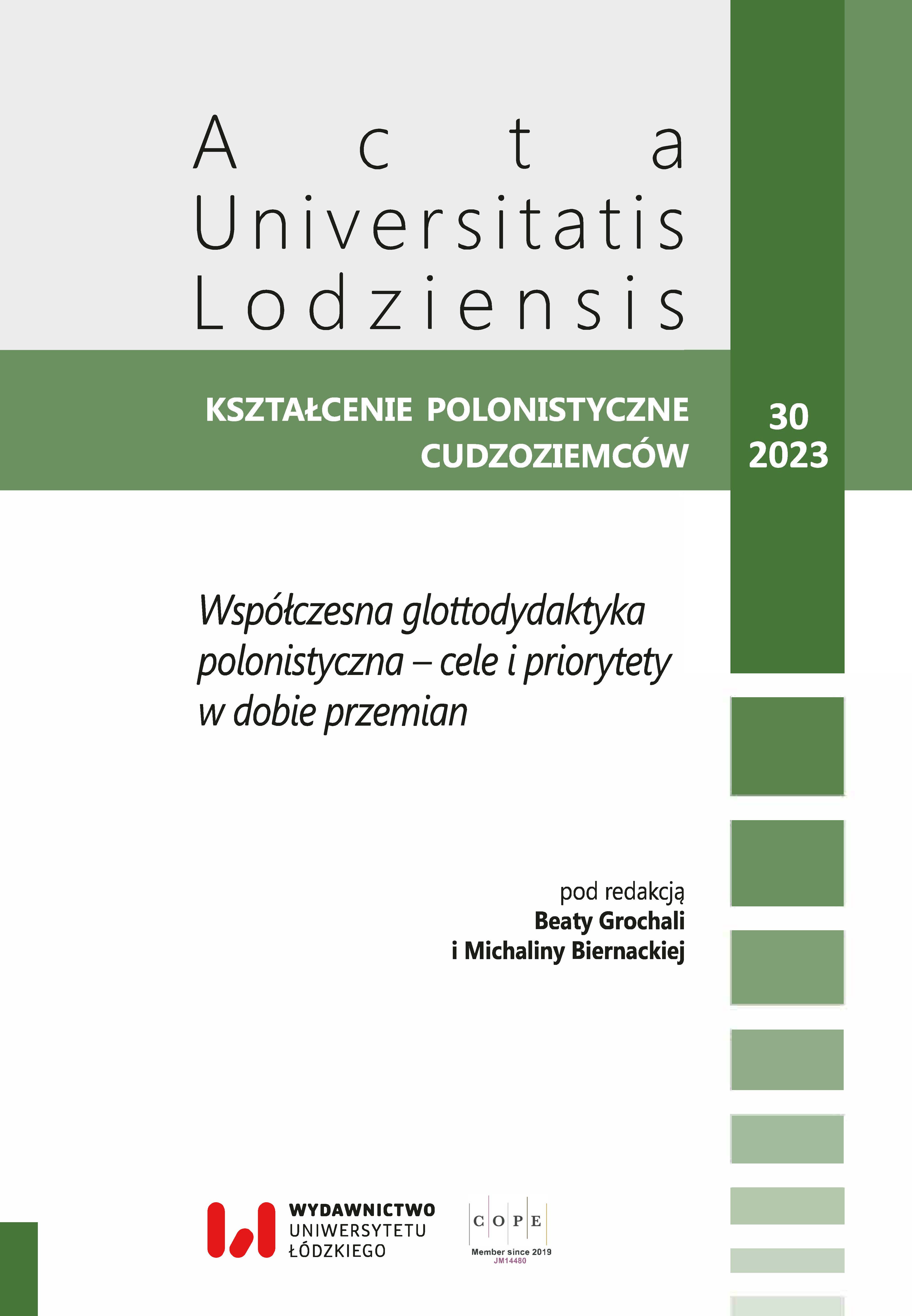Analysis of phonological control indicators in reference to the proposal contained in CEFR Companion Volume (2020)
DOI:
https://doi.org/10.18778/0860-6587.30.07Keywords:
phonological control, indicators, pronunciation, prosodic featuresAbstract
The first part of the article discusses the proposed description of phonological control which has been added and further developed in the updated version of CEFR Companion Volume (2020). In the first version of the document (CEFR 2001), phonological control was defined, but its development and impact on foreign language proficiency did not attract wider glottodidactic reflection. There was also a lack of indicators in relation to individual levels of language proficiency. This article proposes a Polish translation of the scale of phonological control proficiency set out in CEFR–CV, which consists of overall phonological control, sound articulation, and prosodic features. The second part of the article contains an analysis of these indicators and a polemic with the new proposal for describing phonological proficiency, with reference to psycholinguistic research and glottodidactic practice.
References
Berko Gleason J., Bernstein Ratner N., 2005, Psycholingwistyka, Gdańsk.
Google Scholar
Biernacka M., 2016, Znajdź z polskim wspólny język. Fonetyka w nauczaniu języka polskiego jako obcego. Poradnik metodyczny, Łódź.
Google Scholar
Common European Framework of Reference for Languages: Learning, teaching, assessment – Companion Volume with New Descriptors [CEFR–CV], 2020, Strasbourg.
Google Scholar
De Meo A., 2012, How credible is a non-native speaker? Prosody and surroundings, w: M.G. Busà, A. Stella (red.), Methodological Perspectives on Second Language Prosody. Papers from ML2P 2012, s. 3–9.
Google Scholar
Elkhafaifi H., 2005, Listening comprehension and anxiety in the Arabic language classroom, „Modern Language Journal”, nr 89 (2), s. 206–220. https://doi.org/10.1111/j.1540-4781.2005.00275.x
Google Scholar
DOI: https://doi.org/10.1111/j.1540-4781.2005.00275.x
Europejski system opisu kształcenia językowego – uczenie się, nauczanie, ocenianie [ESOKJ], 2003, Warszawa.
Google Scholar
Gluszek A., Dovidio J.F., 2010a, Speaking with a nonnative accent: Perceptions of bias, communication difficulties, and belonging in the United States, „Journal of Language and Social Psychology”, nr 29 (2), s. 224–234. https://doi.org/10.1177/0261927X09359590
Google Scholar
DOI: https://doi.org/10.1177/0261927X09359590
Gluszek A., Dovidio J.F., 2010b, The way they speak: A social psychological perspective on the stigma of nonnative accents in communication, „Personality and Social Psychology Review”, nr 14(2), s. 214–237. https://doi.org/10.1177/1088868309359288
Google Scholar
DOI: https://doi.org/10.1177/1088868309359288
Horwitz E.K., Horwitz M.B., Cope J., 1986, Foreign language classroom anxiety, „The Modern Language Journal”, nr 70 (2), s. 125–132.
Google Scholar
DOI: https://doi.org/10.1111/j.1540-4781.1986.tb05256.x
Horowitz E.K., 1991, Wstęp, w: E.K. Horwitz, D.J. Young (red.), Language Anxiety: From Theory and Research to Classroom Implications, Nowy Jork, s. xiii–xiv.
Google Scholar
Horowitz E.K., Young D.J., 1991, Language anxiety: from theory and research to classroom implications, New Jersey.
Google Scholar
Kramsch C., 1997, Guest Column: The Privilege of the Nonnative Speaker, „PMLA”, nr 112(3), s. 359–369. https://doi.org/10.2307/462945
Google Scholar
DOI: https://doi.org/10.1632/S0030812900060673
Kuhl P.K., 2007, Język, umysł i mózg: doświadczenie zmienia percepcję, w: B. Bokus, G.W. Shugar (red.), Psychologia języka dziecka. Osiągnięcia, nowe perspektywy, Gdańsk, s. 34–62.
Google Scholar
Lev-Ari S., Keysar B., 2010, Why don’t we believe non-native speakers? The influence of accent on credibility, „Journal of Experimental Social Psychology”, nr 46(6), s. 1093–1096. https://doi.org/10.1016/j.jesp.2010.05.025
Google Scholar
DOI: https://doi.org/10.1016/j.jesp.2010.05.025
Prizel-Kania A., 2017, Psycholingwistyczne i biologiczne podstawy nauczania wymowy, „Języki Obce w Szkole”, nr 2, s. 4–7.
Google Scholar
Ramírez Verdugo D., 2005, The nature and patterning of native and non-native intonation in the expression of certainty and uncertainty: Pragmatic effects, „Journal of Pragmatics”, nr 37/12, s. 2086–2115. https://doi.org/10.1016/j.pragma.2005.02.012
Google Scholar
DOI: https://doi.org/10.1016/j.pragma.2005.02.012
Thorne S., 2005, Accent Pride and Prejudice: Are Speakers of Stigmatized Variants Really Less Loyal?, „Journal of Quantitative Linguistics”, nr 12(2–3), s. 151–166. https://doi.org/10.1080/09296170500172460
Google Scholar
DOI: https://doi.org/10.1080/09296170500172460
Downloads
Published
Versions
- 2023-12-07 (2)
- 2023-12-07 (1)
How to Cite
Issue
Section
License

This work is licensed under a Creative Commons Attribution-NonCommercial-NoDerivatives 4.0 International License.










